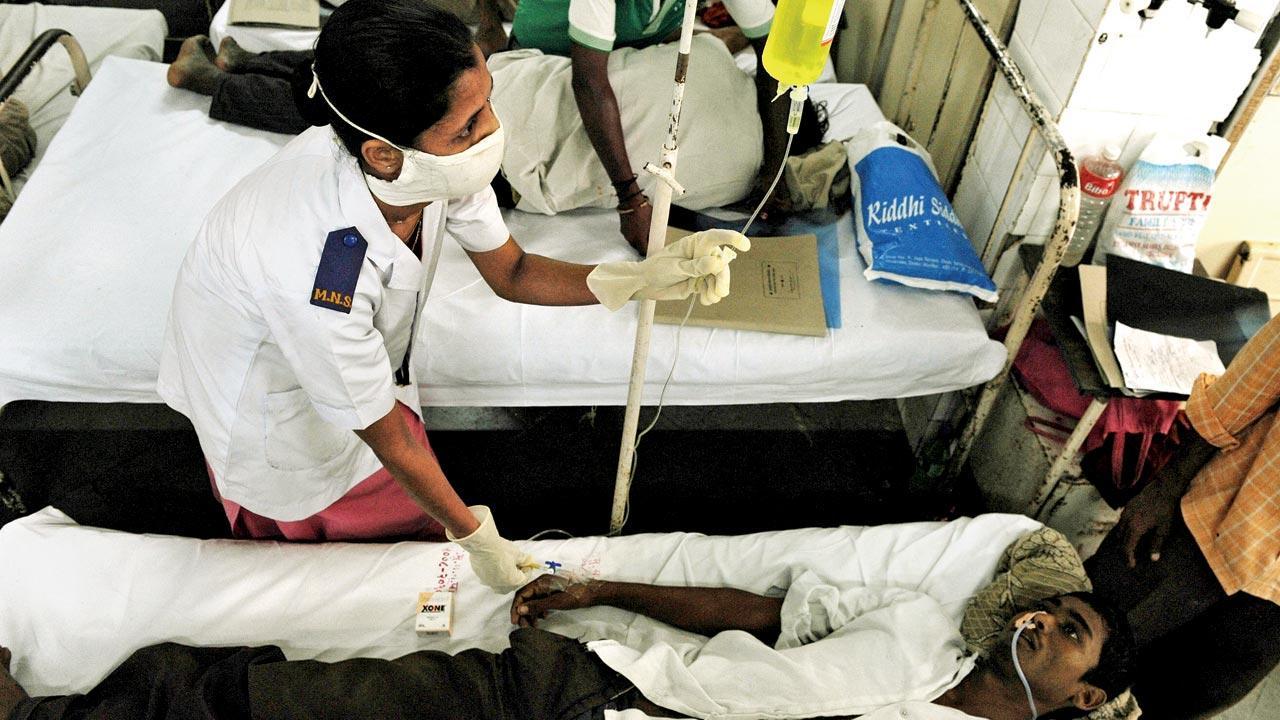Maharashtra cabinet clears proposal to invite private investment for creating healthcare infrastructure and mitigating shortage of qualified doctors

A nurse attends to a patient at KEM hospital. File picture
The Maharashtra Cabinet on Wednesday cleared a proposal to build new medical colleges and multispeciality hospitals in partnership with private entities. The public-private-partnership and private finance initiative (PPP-PFI) scheme will be implemented in consultation with the International Finance Corporation (IFC).
ADVERTISEMENT
Similar PPPs are in operation in the neighbouring states of Gujarat and Karnataka. NITI Aayog has conceptualised a scheme based on successful experiments in the two states. Maharashtra will follow NITI Ayog’s model for inviting investors. The Centre will offer viability gap funding to the PPA projects.
The PPP-PFI will work for upgrading the existing colleges for more MBBS students (up to 250 per college), PG and super speciality seats, building green field/full-service medical institutes/hospitals, nursing and paramedical schools, with full control of the state.
Also Read: BMC to soon get jumbo medical oxygen bottling plant at Mahul Road
A 100-MBBS seat medical college will need an investment of Rs 800 crore. In PPP, the private partner will return the facility it has built and operated, to the government after 10-15 years. The government will have 30 per cent share in the expenditure and it will have the ownership, clinical and educational services under its control.
The CMO said the industry department may come up with a package incentive scheme to attract investment in remote areas where medical facilities are sparse. An empowered group led by the Chief Secretary will verify proposals and approve them, if found fit for the PPP model.
The new colleges will add 1,000 PG seats in three years and 2,600 UG seats every year for the next ten years. The outdoor patients department will examine one crore more and the indoor will have 10 lakh more. The government proposes to conduct 2,500 more surgeries every year, and have 200 more super speciality seats from 2026. The new hospitals will also create skilled and unskilled jobs.
Currently, the public health/medical education department and municipal bodies provide healthcare through state-run district hospitals and medical colleges, but the rural parts don't get covered by the hospitals that provide speciality and super speciality. The rural population travels to the cities, but the majority of them cannot afford expensive treatment in urban private hospitals. The state and municipal-run hospitals, like the ones in Mumbai, are always overcrowded and burdened. The private medical colleges, most of which are run by the organisations affiliated with influential politicians from the current government, are also there but they don’t match the state-run facilities in terms of concessions offered to the poor.
State-run hospitals and medical colleges don’t have enough doctors due to the vacancies that aren’t filled because of the shortage of qualified people that poorly reflects a ratio of 0.64 (MBBS) doctors per 1,000 people. The super specialists number is 1/5th of the total requirement.
The CMO said the PPA concession agreements will be in tune with NITI Aayog’s model. It said, “The welfare of patients and employees will be ensured. It will also be ensured that the private partner gets returns on his investment. A separate authority and mechanism will be formed to see the scheme get implemented by 2030.”
According to information, NITI Aayog has developed a PPA model on the arrangements that are operative in the states of Gujarat and Karnataka. In this, the private partner is supposed to design, build, finance, operate and maintain the medical college and also upgrade, operate and maintain the associated district hospital with a minimum annual student intake of 150 MBBS seats. The state-run district hospitals, which are already there, will be the state’s contribution to the partnership.
30 per cent
Govt’s share in the expenditure of colleges created under the model
Do it please
Chief Minister Uddhav Thackeray, Deputy CM Ajit Pawar and Revenue Minister Balasaheb Thorat met Governor Bhagat Singh Koshyari at Raj Bhavan on Wednesday night. Pawar said they requested the governor to not delay the appointment of 12 people of eminence to the upper house, as the Cabinet’s proposal is pending with him for 10 months. “The governor heard us, and said he would take appropriate decision,” said Pawar after the meeting. Pic/Raj Bhavan
 Subscribe today by clicking the link and stay updated with the latest news!" Click here!
Subscribe today by clicking the link and stay updated with the latest news!" Click here!






